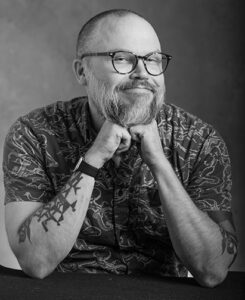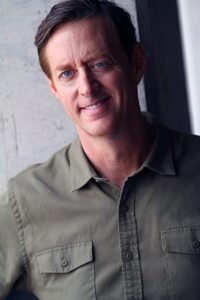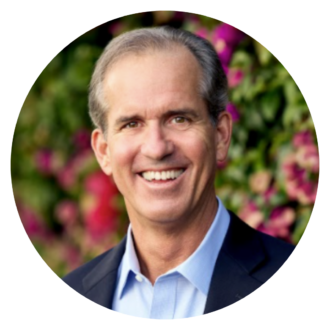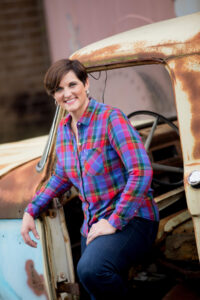Jon Wlasiuk: An Alternative History of Cleveland
January 21, 2025 by David
Filed under Non-Fiction, WritersCast
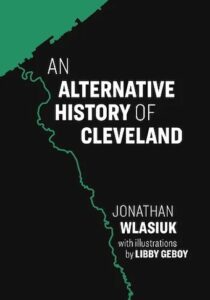 An Alternative History of Cleveland – Jon Wlasiuk – Illustrated by Libby Geboy – Belt Publishing – Paperback – 9781953368799 – 244 pages – paperback – $19.95 – October 15, 2024
An Alternative History of Cleveland – Jon Wlasiuk – Illustrated by Libby Geboy – Belt Publishing – Paperback – 9781953368799 – 244 pages – paperback – $19.95 – October 15, 2024
This is a terrific book published by the very fine independent Belt Publishing (now part of Arcadia Publishing, a company that specializes in books about locales). Belt has long focused on books about the midwest, specifically the rust belt from which its name derives. One of its goals has been to dispel myths about the midwest and its places, not just for outsiders, but for the people who live there themselves who often do not realize the depth of the places they inhabit.
Jon Wlasiuk’s Alternative History of Cleveland is unusual and surprising. Based on the title of the book, I was expecting to be reading a Howard Zinn style political history of the city, but what Wlasiuk has done is to write a much more inventive, somewhat personal, and thoroughly engrossing narrative that takes us from the geological underpinnings of northast Ohio, through the comings and goings of indigenous peoples, and into the modern historic era, weaving together ecology, sociology, geography, arts and culture, to open our eyes to a place that so many have failed to fully comprehend. The theme throughout is that city and nature are thoroughly intertwined, and there are many people today working to make Cleveland a better place for people and nature to thrive together. Wlasiuk’s vision of the city and its environs is one that all of us can relate to, wherever we ourselves inhabit the earth. It’s a wonderful book I can highly recommend.
Talking with Jon about this book was rewarding and enjoyable for me – I hope you will feel the same after listening to this episode.
Jon Wlasiuk was born in northwest Ohio and earned a PhD in environmental history from Case Western Reserve University in Cleveland. He has taught at colleges throughout the Great Lakes region, and now lives in the Slavic Village neighborhood.
Illustrator Elizabeth (Libby) Geboy was born and raised in Wisconsin, and lives in Colorado. Her illustrations translate favorite subjects in the natural world, specifically food, flora, and fauna into art.
Podcast: Play in new window | Download
Cornelia Maude Spelman: Missing: A Memoir
October 25, 2022 by David
Filed under Non-Fiction, WritersCast
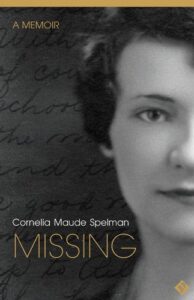 Missing: A Memoir – Cornelia Maude Spelman – Jackleg Press – 9781737513445 – Paperback – 176 pages – $17.00 – July 15, 2022 – ebook versions available at lower prices
Missing: A Memoir – Cornelia Maude Spelman – Jackleg Press – 9781737513445 – Paperback – 176 pages – $17.00 – July 15, 2022 – ebook versions available at lower prices
Cornelia Maude Spelman is best known as a children’s book author. This memoir of her family was spurred by her meeting with and friendship with the late New Yorker editor William Maxwell (himself an extraordinary writer as well), who knew her parents in the 1920s when they were at the University of Illinois together.
Cornelia plainly admired and enjoyed the company of Maxwell, but also was fascinated that he knew her parents before they had children, before their lives went in different directions than Maxwell’s. At one of her meetings with him, she suggests that her parents’ lives were not successful in the terms they had hoped for. Maxwell gently tells her that “in a good novel one doesn’t look for a success story, but for a story that moves one with its human drama and richness of experience.”
It was Maxwell who prompted Cornelia to explore and tell the story of her parents. This memoir tells that story. Spelman spent years exploring the history of her family. It’s a wonderful exploration, full of side trips and thoughtful reflections, and much that anyone interested in the mysteries of their family members will appreciate. Superman was luckier than most of us, in that she was able to meet with people who knew her parents when they were young. Most of us get interested in these stories far too late in our own lives to be able to talk to people who actually knew our older family members, or who, if still around, can remember anything meaningful to tell us.
Spelman’s research is extensive too. She goes to Iowa and Illinois to track down places and information details of her family history and to find people who know something about her parents and their parents. She recounts letters and interviews, even finding medical records and telegrams to help fill out stories that would otherwise be invisible or lost. Importantly Spelman is able to reconstructs her mother’s life and death, as well as that of her long lost brother. Cornelia’s writing is excellent and her storytelling compelling, so that even though we are not connected to the people about whom she writes, we can feel how she feels about them and about herself as she searches out and tells these “missing” family stories.
Cornelia is always honest with us about her disappointments, as well as what she learns that brings her joy and closure as well. This book is warm, profound, and honest. At the end, we know there is still much that will always be missing, but so much more that has been found.
Cornelia Maude Spelman, MSW, was a family therapist before she became a writer and artist. She’s written eleven books for children that help them manage emotions and difficult life situations. Her The Way I Feel series of books for young children has sold several million copies and been translated into Chinese, Korean, Spanish, Greek, Japanese, German, Arabic, Turkish, Danish, and Russian. Cornelia has earned awards from the Illinois Arts Council and was awarded the Bernard De Voto Fellowship in Nonfiction at Bread Loaf Writers’ Conference. This is her first book for adult readers.
It was truly a pleasure to speak with her about this book and her journey to write it.
Podcast: Play in new window | Download
Robert Child: Immortal Valor: The Black Medal of Honor Recipients of World War II
May 26, 2022 by David
Filed under Non-Fiction, WritersCast
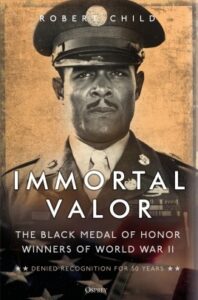 Immortal Valor: The Black Medal of Honor Recipients of World War II – Robert Child – Osprey – 9781472852854 – 288 pages – hardcover – $30 – January 11, 2022 – ebook edition available at lower prices
Immortal Valor: The Black Medal of Honor Recipients of World War II – Robert Child – Osprey – 9781472852854 – 288 pages – hardcover – $30 – January 11, 2022 – ebook edition available at lower prices
It is remarkable to realize how few medals of honor were awarded for service during World War II – there were 432 Congressional medals given out of the over sixteen million men and women who served during that four year period during which America fought large scale brutal wars in both the Pacific and European theaters. It is therefore shocking to find out that not a single African American was among the 432 honorees, despite the fact that over one million African Americans served in the then mostly segregated military environment.
Racism remains an American fact of life. But the “progress” made in the modern era probably has muddied our awareness of what our country was like such a short time ago. Robert Child has done an admirable service with this book, documenting the incredible heroism of the seven Black American heroes of World War II who were finally recognized for their efforts – but only after an incredibly long period of time and much work in their behalf.
Child documents the recent historical investigations that have discovered and the stories of extraordinary acts of heroism and valor by the Black soldiers in World War II who were eventually awarded the highest honor our country offers for wartime service. The group of servicemen includes Vernon Baker, Sergeant Reuben Rivers, and Lieutenant Charles Thomas, who led his platoon that captured a strategically important village in Germany in 1944 despite suffering grievous wounds and losing half the men in his unit. The other four who are portrayed sympathetically and thoroughly in this book are Willy James, Jr., John Fox, Edward A. Carter, Jr., and George Watson, heroes all, not only for their valor in the fights they undertook, but for what they did to overcome the deep-seated endemic racism in the military during the time they served their country.
It was not until 1993 that a US Army commission determined that these seven men had been denied our country’s highest award – only because of racial discrimination. And then it was in 1997, more than 50 years after the war that President Clinton finally awarded the Medal of Honor to them, with only one still being living at the time.
Their stories comprise most of this book, as well as some background about the military before, during and after World War II. Sadly, it is almost certain that there are other Black service men and women who might have deserved recognition for their sacrifices and heroism in that war. It was not even until the Obama administration that two World War I heroes were recognized, Sergeant William Shemin, for whom the anti-semitism of the time meant his amazing feats of heroism were almost lost to history, and Sergeant William Henry Johnson, another Black soldier who had been recognized by France with a Croix de Guerre in 1919, but neglected by the United States for far too long.
It was an honor for me to speak with author Robert Child about this terrific and highly emotional book.
Child is a military history writer, director, and author with. Robert has received writing and directing awards including an Emmy® nomination. He lives in Atlanta.
“This is the only comprehensive narrative written about the African American Medal of Honor recipients of WWII to date. Extremely well written, with very little personal background on some of these men to work with, Child manages to bring each of these heroes’ stories to life on a personal level. Child carefully reconstructs each recipient’s life prior to his act of valor, demonstrating the character traits that made each an example of integrity, sacrifice and courage. This is a must-read book about seven black soldiers and their bravery at the highest level and the racial injustice that took over four decades to acknowledge. Well done!” ―Arthur Collins, President, 5th Platoon, the black World War II education and reenactment group
Podcast: Play in new window | Download
William J. Peters: At Heaven’s Door-What Shared Journeys to the AfterLife Teach about Dying Well and Living Better
January 25, 2022 by David
Filed under Non-Fiction, WritersCast
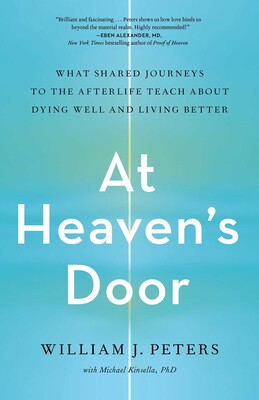 At Heaven’s Door – What Shared Journeys to the Afterlife Teach about Dying Well and Living Better – William J. Peters – with Michael Kinsella – Simon and Schuster – 978-1-9821-5042-6 – Hardcover – 248 pages – $26.00 – January 18, 2022 – ebook editions available at lower prices
At Heaven’s Door – What Shared Journeys to the Afterlife Teach about Dying Well and Living Better – William J. Peters – with Michael Kinsella – Simon and Schuster – 978-1-9821-5042-6 – Hardcover – 248 pages – $26.00 – January 18, 2022 – ebook editions available at lower prices
William Peters is a therapist who had worked for many years with people at the end of their lives. In 2000, when he was volunteering at the Zen Hospice Project in San Francisco , he experienced something very similar to what mystics describe and what some people who have been close to death have reported, the sense of floating in midair, completely out of the body. In this case, he was with his patient in this “other dimension” and the dying person looked at him and smiled. Peters himself returned to his body, but the patient remained unconscious and soon died.
This powerful experience set Peters off on what has become the journey of his life’s work. He began searching for other people who had had similar experiences. He spent more than twenty years finding people, talking to them, and meticulously categorizing their stories to identify the patterns and characteristics of what he calls the “shared crossing” experience. What is really interesting is how similar all these experiences are, regardless of age, gender, background, cultural origin, etc. Many of these stories are included in this book, as people have had visual and sensory effects that are to them evidence of another dimension, that brought with them powerful emotional after-effects that in most cases stayed with them and completely changed their understanding of reality.
Apparently this kind of experience is known to many in the hospice community and even some otherwise rationalist medical practitioners. The book is filled with stories of all kinds, some are spouses and parents of loved ones lost either suddenly or after long illnesses, and some stories are told by individuals who were simply present at someone’s final passage and were chosen to share the experience, or in some cases to help usher the dying person into the light of this “afterlife” dimension.
After years of research and documentation, Peters has a lot to say about what all of these experiences might mean for us – the living. Regardless of our outlooks and beliefs, we all want to know what will happen to us when we die, and those who have shared in the death experience as reported here might allay our all too reasonable fear and help explain what comes next. Our culture does not embrace the experience of death as many other cultures have done – our medicine tries desperately to stave off death, and we are all so attached to living, with no training or understanding of death, we push it away completely.
It does not matter whether you embrace or reject the stories told here, or the literal descriptions of the “afterlife” and the other dimensions the dying experience. Maybe what we experience at death is just a biological projection, after all. Whatever you may choose to believe, knowing more about death, understanding the end-of-life passage, and better integrating it into our lives is important for our psyches.
William Peters is the founder of the Shared Crossing Project and director of its Research Initiative. He has spent many years studying end-of-life experiences. Peters worked as a hospice volunteer with the Zen Hospice Project in San Francisco and as a teacher and social worker in Central and South America. A practicing grief and bereavement therapist, he holds degrees from Harvard’s Graduate School of Education and UC Berkeley.
I had a terrific conversation with William Peters. The book, and my conversation with the author have stayed with me and I continue to explore where it has taken me. It appears to be a simple book, but comes with many layers of understanding and thoughtfulness for the attentive reader.
Visit the Shared Crossing website here.
Podcast: Play in new window | Download
Enrique Salmón: Iwígara: American Indian Ethnobotanical Traditions and Science
January 9, 2022 by David
Filed under Non-Fiction, WritersCast
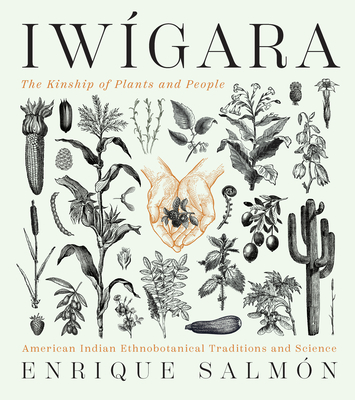 Iwígara: American Indian Ethnobotanical Traditions and Science, The Kinship of Plants and People — Enrique Salmón –Timber Press — 978-1-60469-880-0 — Hardcover – $34.95 – ebook and audio book versions available at lower prices
Iwígara: American Indian Ethnobotanical Traditions and Science, The Kinship of Plants and People — Enrique Salmón –Timber Press — 978-1-60469-880-0 — Hardcover – $34.95 – ebook and audio book versions available at lower prices
This is a truly incredible and hugely inspiring book for me. Enrique Salmón, a member of the Raramuri tribe from Mexico, has spent a lifetime learning and studying the medicinal and cultural properties of North American plants. He now teaches at California State University-East Bay in Hayward, California. His work may place him in academia, but he is fully engaged in the natural world.
Salmon begins his work with the deeply held knowledge that all life-forms are interconnected and share the same breath, which is called Iwígara in the Raramuri tribe.
In this book, Salmón presents us with eighty of the most important plants used by North American indigenous peoples. Of course, plants have always been used as food and medicine by indigenous peoples. What is important knowledge for those who are interested in engaging with a plant centric life are the passed down information about identification and harvest, the nature and applications of plants for food and medicine, and to understand how they have been central to traditional stories and myths for the disparate cultures across this continent.
Salmón honors the traditions and practices of so many different tribes here, and helps us understand the variation across different biomes and cultures of the people who live in them. Some of us learn deeply in a specific place across long periods of time, while others may trade breadth for depth. Native peoples are among the former, but most modern people fall into the latter category. A book like this one helps bridge the two different approaches to knowledge. Salmón recognizes that tension, and manages it well here. He understands that one cannot live in deep connection to the natural world without choosing a place in which to live. But readers need to know where to begin, and this book can be an introduction for anyone who wants to begin their own journey of learning and knowledge about plants, healing and cultural traditions.
I should mention also that the book is beautifully designed and includes many excellent photographs and illustrations, most in color. It is excellent work, combining narrative with references suited to beginners and experienced naturalists alike.
Enrique is also the author of Eating the Landscape: American Indian Stories of Food, Identity, and Resilience (2012).
I was honored to have the opportunity to speak with Enrique Salmón for Writerscast about his work, and hope you will enjoy listening to a truly knowledgeable plant practitioner.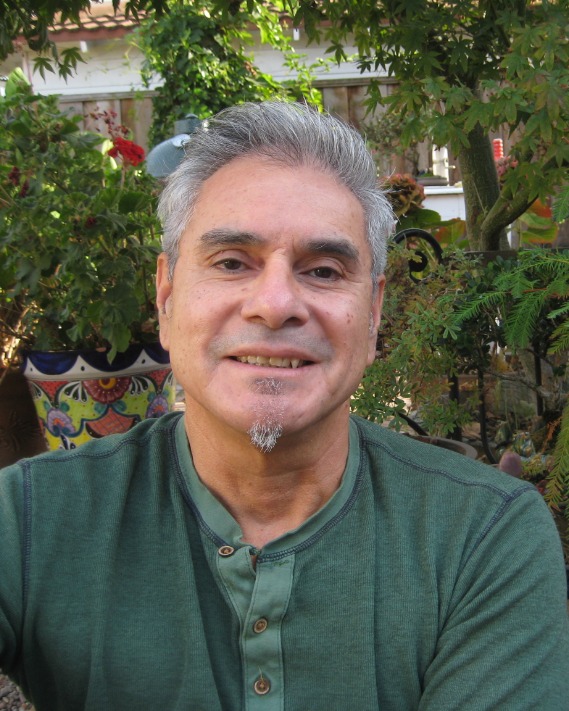
Purchase Iwígara from Bookshop.org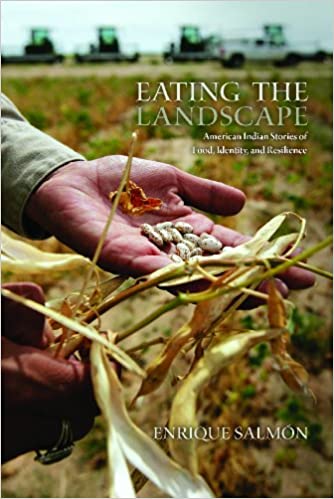
Podcast: Play in new window | Download
Publishing Talks: Interview with Jeff Deutsch of Seminary Co-op Bookstores
October 12, 2021 by David
Filed under PublishingTalks, The Future
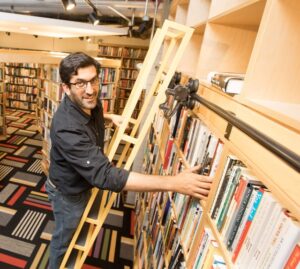 Publishing Talks began as a series of conversations with book industry professionals and others involved in media and technology, mostly talking about the future of publishing, books, and culture. I’ve spent time talking with people in the book industry about how publishing is evolving in the context of technology, culture, and economics.
Publishing Talks began as a series of conversations with book industry professionals and others involved in media and technology, mostly talking about the future of publishing, books, and culture. I’ve spent time talking with people in the book industry about how publishing is evolving in the context of technology, culture, and economics.
Some time back, this series broadened to include conversations that go beyond the future of publishing. In an effort to document the literary world, I’ve talked with a variety of editors, publishers and others who have been innovators and leaders in independent publishing in the past and into the present.
These conversations have been inspirational to me on many levels. I have gotten to speak with visionaries and entrepreneurs, as well as editors and publishers who have influenced and changed contemporary literature and culture. I’ve also had the opportunity to speak with a number of friends and colleagues I have met over the many years I have been in the book business.
This week’s podcast is one I am really excited about. Jeff Deutsch is the director of Chicago’s Seminary Co-op Bookstores, which calls itself the first not-for-profit bookstore in the United States whose mission is devoted to bookselling (there are other nonprofit bookstores of course, generally components of literary centers, like Beyond Baroque in Venice, California, Woodland Pattern in Milwaukee, and Writers and Books in Rochester, NY are examples).
Last spring I read a report of a Book Industry Study Group panel that included Jeff, and what he talked about immediately caught my attention. Deutsch was reported to have said that the model of bookselling we’ve inherited needs to be rethought: just facilitating more sales, more efficiently, is not the way for bookstores to survive. A bookstore that actually means something to readers will need to carry a deep backlist and to spend time helping readers discover new voices, new texts.
During that panel Deutsch said, “The publishing world and distributors—what you value is not our ability to sell books,” because independent bookstores can never sell in the same volume as Amazon. “Yet we all know how important bookstores are,” he said. As publishers and booksellers once knew, developing readerships for books and authors takes time and devotion that have been boiled out of the entire process now.
Jane Friedman’s outstanding book industry newsletter Hot Sheet compared Jeff’s approach to the Slow Food movement (I think that idea makes sense – I wrote a manifesto for publishers a few years ago on the idea of Slow Publishing, but never developed it enough to publish). Nina Barrett, owner of Bookends & Beginnings in Illinois (which has filed a lawsuit against Amazon), also on the BISG panel said “I think it’s like Alice Waters talking for decades about a sustainable food ecosystem and ultimately revolutionizing the food industry that way. That’s the point we’re at.”
As Jane pointed out, “independent booksellers will lose every time if they base their worth on the mere transactional value of selling books. His stance—that bookselling has a deeper meaning and cultural value—is indeed how boutique and online retailers outside of the Amazon ecosystem are positioning themselves for success.”
Deutsch also said, “We should figure out models that support the work that we’re trying to do, not shoehorn this other model of retail that is really just about buying and selling and not about culture….We all have vocational awe, but couldn’t we have vocational awe and still make a decent living?”
This conceptual framework resonates with me and I think is worthy of much more discussion. Why shouldn’t there be a nonprofit bookselling sector to promote literary and other noncommercial books and authors, just as there is a nonprofit theater? Why should we continuously try to fit a crucially important culture activity into a commercial model, and always fail?
I hope that hearing Jeff talk about this concept will help stimulate further discussion and concrete action. Please feel free to comment and if you are interested in helping, please be in touch.
Connect to the Seminary Co-op Bookstores website here.
Before joining the Co-op Deutsch was the director of stores for the Stanford Bookstore Group and prior to that managed the Cal Student Store at the University of California, Berkeley.

Podcast: Play in new window | Download
Anders Dunker: Rediscovering Earth
May 18, 2021 by David
Filed under Non-Fiction, WritersCast
 Rediscovering Earth: Ten Dialogues on the Future of Nature – conversations with Anders Dunker – OR Books – 9781682195086 – Paperback – 240 pages – $23 – ebook versions available at lower prices
Rediscovering Earth: Ten Dialogues on the Future of Nature – conversations with Anders Dunker – OR Books – 9781682195086 – Paperback – 240 pages – $23 – ebook versions available at lower prices
Thinking about how to think about climate, earth, humans on it, and the future, are major challenges for all of us who care about the future of our planet. It may be that most of us alternate between despair and rage, and even with an optimist’s outlook, we have trouble dealing with the sheer scope of what is happening to our surroundings (I think using the words “environment” and “earth” and “planet” has now become counterproductive).
I am constantly searching for writing, whether it is in books, online or in magazines, that will offer me constructive perspectives, different and hopefully better conceptual frameworks than those we have developed, toward making it possible to be both continually engaged and continually energized. I don’t usually feel I can do that on my own.
Anders Dunker’s collection of conversations with some of the deeper thinkers about the future and us in it, turns out to be very useful. The diverse viewpoints, the language of thoughtfulness and care, the commitment to inquiry, are all inspiring elements of this short book. And with such a diverse set of outlooks, it is possible to not lose sight of the core reason for this book to exist – to inspire hope.
Dunkers poses this question: “if we know that we are destroying the planet, our habitat, why do we continue to do it?” His dialogues attempt to investigate this question, and thereby come to some sense of how we might go forward, not ourselves alone, but the nature that we rely on, together.
This is the challenge we face right now. The challenge will be different in a few years, the unfolding story will force a reckoning. For now, those who read the stories in Rediscovering Earth will be able to come to a better sense of what we can and must do together in this moment.
Dunkers proposes that our future, nature itself, will be based on how we navigate the realm of culture, including philosophy, art and literature, the groundwork of our being, as much as or more than in scientific and technological matters. In order to act, we must redefine ourselves, become truly planetary citizens, and recognize how we are all connected, and then act upon, from that, understanding.
We had a terrific conversation, not only about the book and the contributors to it, but about how we will uncover the future and live in it together. A very hopeful experience. I came away from our talk fully energized, and feeling stronger.
Anders Dunker bio (from his website): Born in Norway, raised in the countryside in a family much dedicated to wildlife and nature. Educated in humanistic subjects and Cultural History at the University of Oslo, with Philosophy, Comparative Religion and Comparative Literature as main subjects. Teacher of Aesthetics and other subjects at the University of Oslo, Philosophy and Cultural History in Rome and Barcelona.
Senior lecturer at Kulturakademiet (Norwegian private college) for 10 years, now writer for acclaimed Norwegian & international newspapers and magazines (Le Monde diplomatique, LA Review of Books, NyTid, Vagant, Samtiden, Modern Times Review, Agora). Board member of the Norwegian Writers’ Climate Campaign,
Series Editor of Futurum Collection at Existenz Publisher (Norway) and Editorial Board Member at Technophany, a journal for Philosophy and Technology.
His current book projects include an essay on the future as seen from California and a volume on Peter Sloterdijk’s philosophy. Anders currently lives with his wife, an environmentalist and animalist singer, in Los Angeles, California. He is also a plein air painter.

From Dialogue One: “The Rediscovery of the Earth—with Bruno Latour”
Anders Dunker (AD): Historically, the age of discovery is over. Are we none the less in a new age—an age of rediscovery—that can lift our spirits and propel us past the nagging feelings of tragedy?
Bruno Latour (BL): Well, it is my way of being optimistic. It is my way of not taking part in the sense of doom. Scientifically and technically, it is perfectly rational to be a pessimist, but I don’t think it makes much sense politically. Optimism has nothing to do with technoscience—DNA plus cognitive science plus robots plus outer space. Instead it is connected with exploring the world we thought we knew. I will borrow the term from you and call our time period an age of rediscovery, even if it is grandiose. What we call local has quite a different meaning in relation to Gaia than it previously had. It now has many different dimensions. The rediscovery of a place is in some ways a cliché—since ecologists have been talking about the same thing for years—but this concept also leads to a different way of framing the world, it leads to another geometry, so to speak. Water gets another meaning. Ice gets another meaning. Industry is considered in relation to the amount of CO₂ in the atmosphere. We see things in new ways. Antibiotics have a different kind of globalization than weeds, for example.
AD: Traditionally, the concept of the local has had a flavor of subjectivity—existence circumscribed by the immediate horizon—in contrast to the scientific gaze, which purports to see everything as if from outer space?
BL: And here lies the error. The local is objective. The gaze from inside the critical zone is completely objective, it is just objective in a different way. What we see is real, but this reality only becomes visible if we learn what different parties are up to, what they need, what they want, what they can accomplish.
Buy the book directly from the publisher, OR Books.
Podcast: Play in new window | Download
Frank Figliuzzi: The FBI Way – Inside the Bureau’s Code of Excellence
May 5, 2021 by David
Filed under Non-Fiction, WritersCast
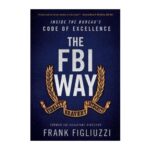 The FBI Way: Inside the Bureau’s Code of Excellence – Frank Figliuzzi – 9780062997050 – hardcover – HarperCollins – 272 pages – $27.99 – January 12, 2021 – ebook versions available at lower prices
The FBI Way: Inside the Bureau’s Code of Excellence – Frank Figliuzzi – 9780062997050 – hardcover – HarperCollins – 272 pages – $27.99 – January 12, 2021 – ebook versions available at lower prices
If you have been paying attention to the news for the five years since the US elevated Donald J. Trump to the presidency of the United States, with the help of Fox News, the Mercer family, the Koch brothers and their associates, Facebook, Twitter and other social media, aided further by the moral and intellectual bankruptcy of the Republican Party, the vapidity of the mainstream media, years of inattention to the teaching of American history and civics in schools everywhere, undergirded by a calculated, systematic conspiracy with the Russian government (that no doubt, was surprised by how easy it was to game the greatest democracy in the history of the world), you have seen and heard the former FBI agent, Frank Figliuzzi, on MSNBC and other news outlets, talking about the visible public corruption that was going on throughout this painful period of our lives.
For many of us who remember the fifties, sixties and seventies, when the FBI was a witting tool of a repressive political state, it has been more than disconcerting to suddenly see the FBI as an upstanding exemplar of a rule-abiding democracy – that is under attack from a right wing political party that used to (over) value the rule of law in service to the capitalist enterprise. That attack, surreal as it would seem, is a symptom of the “down is up” necessities of authoritarianism, which is where the Republican party has traveled to over the past few years. Trump was and is not the head of the beast, he was and is simply a tool used by a particular power center that found him as he found them, willing partners in a plan that serves their various contiguous but-not-entirely-shared needs and goals. Do not underestimate the war being waged against reality still going on in full force, even though the dumpster is no longer the head of state.
Which brings us back to the matter at hand. Frank Figliuzzi is a throwback to a world that too often does not still appear to be with us. The three words on the cover of his book are at the core of the FBI’s training and belief system: “Fidelity, Bravery, Integrity.” These principles mean everything to him. Cynical as so many of us are today, it is novel, and even heartening to meet someone who believes so deeply and completely in a moral system at a time when even honor systems all too often are not honored (West Point is a good example) and when elected officials so readily ignore their oaths of office. We need people who can remind us by the example of their behavior (and their words), that fairness, honesty, and justice can still exist in our society.
Figliuzzi is aware of this. He aims his book at leaders in businesses and other institutions, to demonstrate to them and all of us, the enduring power and value derived from following principles that honor and respect the people that work there, their stakeholders at every level, and the institutions themselves. As I started to read this book, I wondered how the FBI, as a law enforcement organization, could be stood up as a model for profit-making businesses and non-governmental organizations, but Figliuzzi is persuasive, and the ideas he communicates are indeed powerful. Many of the examples he provides to document why the FBI should be viewed as a model for others are surprising, as they demonstrate a commitment to deeply moral values, and to treating individual employees as human beings rather than simply as cogs in an inhumane machine.
“It’s times like these” that make books like this one crucial and important. It’s impossible not to be deeply affected by this book in ways that you might not have expected.
Figliuzzi is a smart guy, and as an experienced media figure, he knows how to tell a compelling story. I find myself somewhat surprised to say that The FBI Way is a useful and maybe even an important book for our times. I very much enjoyed our conversation and I trust you will as well, though I doubt anyone listening here will be signing up to join the FBI anytime soon.
“Figliuzzi’s war stories of hunting terrorists are spellbinding, but equally important is his playbook for how the FBI’s methods for achieving excellence in performance can be duplicated by a wide variety of organizations. This should be required reading in business schools across America.” – Andrea Mitchell, Chief Foreign Affairs Correspondent, NBC News
Author website here.
Buy the book here.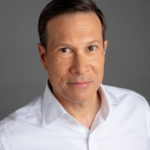
Podcast: Play in new window | Download
Even as We Breathe, A Novel: Annette Saunooke Clapsaddle
December 1, 2020 by David
Filed under Fiction, WritersCast
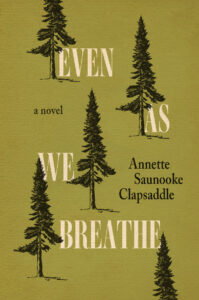 Even as We Breathe, A Novel – Annette Saunooke Clapsaddle – 9781950564064 – University Press of Kentucky – Hardcover – 240 pages – September 2020 – $24.95 – ebook versions available for sale at lower prices
Even as We Breathe, A Novel – Annette Saunooke Clapsaddle – 9781950564064 – University Press of Kentucky – Hardcover – 240 pages – September 2020 – $24.95 – ebook versions available for sale at lower prices
This has been a good year to read fiction, and I am really pleased to have discovered this author. She is a fine writer whose storytelling is powerful, yet restrained.
While this novel has some elements of a mystery, it is really a very personal story about family, love and growing up into the world of western North Carolina during World War II. The book’s main character is nineteen-year-old Cowney Sequoyah, who has grown up in the woods of Cherokee land, raised mostly by his grandmother. The novel is set between the upscale Grove Park Inn, an Asheville resort serving as an internment camp for diplomat prisoners of war and their families.
The Inn provides Cherokee men and women with employment off their reservation, and this is Cowney’s first real time away from home. At the core of the story, Cowley is accused of being involved in the disappearance of a diplomat’s daughter and must move back and forth to home as he attempts to understand the basis of the the unfair accusations, and prove his innocence while at the same time wrestling with his newfound love for another young Cherokee, Essie Stamper, and figuring out his complex family history.
There is alot going on in this subtle and quietly told novel! And a number of surprises are in store for the reader that bring the story to a remarkable and rewarding close.
Even As We Breathe is filled with details and moments that identify the Cherokee tribe and its homeland. The story gives Annette the opportunity to express the meanings of the Cherokee culture as it has survived into the modern world, sometimes still with the values of its people in conflict with the world of white people.
A secret room in the Grove Park Inn becomes a place where Cowney and Essie can escape the white world and try to imagine their futures independent of outsider influences. For awhile, it can feel to them that they have a place of their own. But racism and prejudice are constantly present, and both Cowney and Essie must face disappointment, and struggle to define their identities as Cherokees within a complicated environment that does not give them the space they truly need to be themselves.
Annette Saunooke Clapsaddle, an enrolled member of the Eastern Band of Cherokee Indians (EBCI), graduated from Yale University and has a masters from the College of William and Mary. Her unpublished novel, Going to Water won the Morning Star Award for Creative Writing from the Native American Literature Symposium and was a finalist for the PEN/Bellwether Prize for Socially Engaged Fiction. After serving as Executive Director of the Cherokee Preservation Foundation, Annette (National Board Certified since 2012) returned to teaching English and Cherokee Studies at Swain County High School. She is the former co-editor of the Journal of Cherokee Studies and serves on the Board of Trustees for the North Carolina Writers Network.
“Debut writer Annette Saunooke Clapsaddle lifts the curtain to show us a South we don’t know, revealed through the struggles of Cowney Sequoyah, a young man growing up within the Cherokee Nation of far Western North Carolina, and yet another surprise setting when he takes a job at Asheville’s fabled Grove Park Inn while it is being used by the US military as a place of internment for Axis prisoners of war during World War II. Even As We Breathe is a wonderful novel, complicated as life itself — thrilling, mysterious, and finally, a revelation!” — Lee Smith, New York Times bestselling author of Blue Marlin
This novel was impossible for me to put down and is one of my favorite books I have read this year. It was a deep pleasure for me to speak with Annette about this book and her writing.
I believe you will enjoy this conversation as much as I did.
Purchase Even as We Breathe from Bookshop.org to support independent bookselling.
Author’s website here.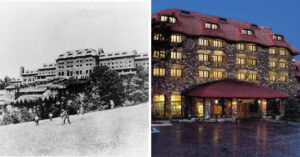
Podcast: Play in new window | Download
American Gospel, A Novel: Lin Enger
November 11, 2020 by David
Filed under Fiction, WritersCast
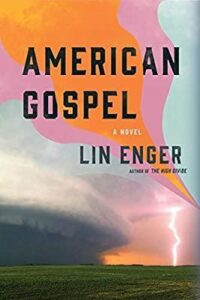 American Gospel, A Novel – Lin Enger – 978-1-5179-1054-9 – University of Minnesota Press – Hardcover – 248 pages – October 27, 2020 – $24.95 – ebook versions available for sale at lower prices
American Gospel, A Novel – Lin Enger – 978-1-5179-1054-9 – University of Minnesota Press – Hardcover – 248 pages – October 27, 2020 – $24.95 – ebook versions available for sale at lower prices
I read Lin Enger’s last novel, High Divide, a few years ago and was really taken with his writing and the mythic fictional structures he loves to tell. Storytelling is certainly humanity’s oldest art form. We use stories to explain ourselves to ourselves. Lin seems to breathe storytelling like air. His new novel is very different than his earlier books, at least that it is set more or less in modern times and in northern Minnesota, a place that Lin is completely familiar and comfortable with.
American Gospel begins in 1974 while the rest of the country is fixated on the Watergate scandal, on a north woods Minnesota farm, where Enoch Bywater, a self-styled preacher has had a vision of the Rapture. It is all so real for him, he believes that the end of the world is about to be upon us. His millennial dream is shared by his followers, and then as word spreads about the impending end of the world, his Last Days Ranch attracts a polyglot of dreamers and believers in a completely American quest for emergence.
Enoch’s son, estranged both from his father, and from Minnesota, is an aspiring reporter with his own dreams and ambitions who is attracted back home by the potential for a big story – and the possibility of reconnecting with his high school love who is now a Hollywood star, the biggest thing to ever happen to their small rural town.
And there is still more intrigue involving other characters with their own complex agendas, and the backdrop of the denouement of the Nixon saga.
Lin Enger enjoys telling stories that involve men and their fathers. And he is taken with mythological, almost Jungian figures. In this book we have father figures of all kinds – God, the president, the preacher, and even his son. The psychic wounds of America are on full display and the resonance with our current time is unmistakable.
Enger is a compassionate and perceptive writer whose prose is clean and clear. He plainly loves to shed light on who we are and what we must do in order to live together as humans in a complex, disparate modern world. American Gospel is a quietly brilliant novel that I hope will find a large audience.
Lin Enger grew up in Minnesota and now lives in Moorhead, where he teaches English at Minnesota State University. He’s won many awards for his fiction, which include the novels, The High Divide (2014) and Undiscovered Country (2008). During the 1990s Lin and his brother, the novelist Leif Enger collaborated (as L. L. Enger) on a series of mystery novels for Pocket Books.
I always enjoy speaking with Lin. We had a terrific conversation about this book, and much more for this podcast episode. I hope you enjoy it as much as I did.
Author’s website is here.
You can buy American Gospel from Bookshop.org.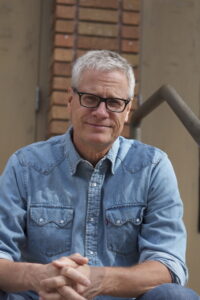
Podcast: Play in new window | Download

